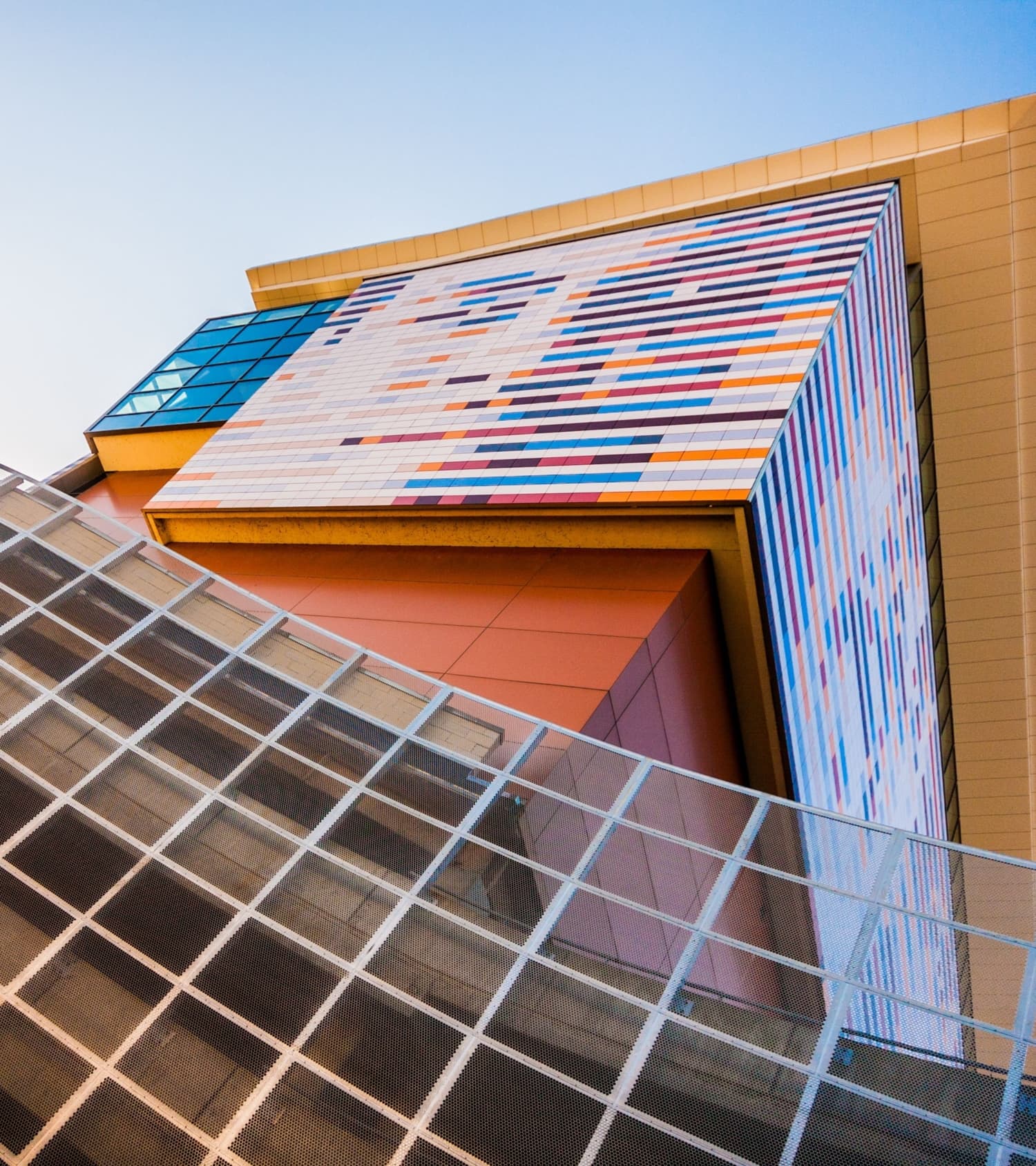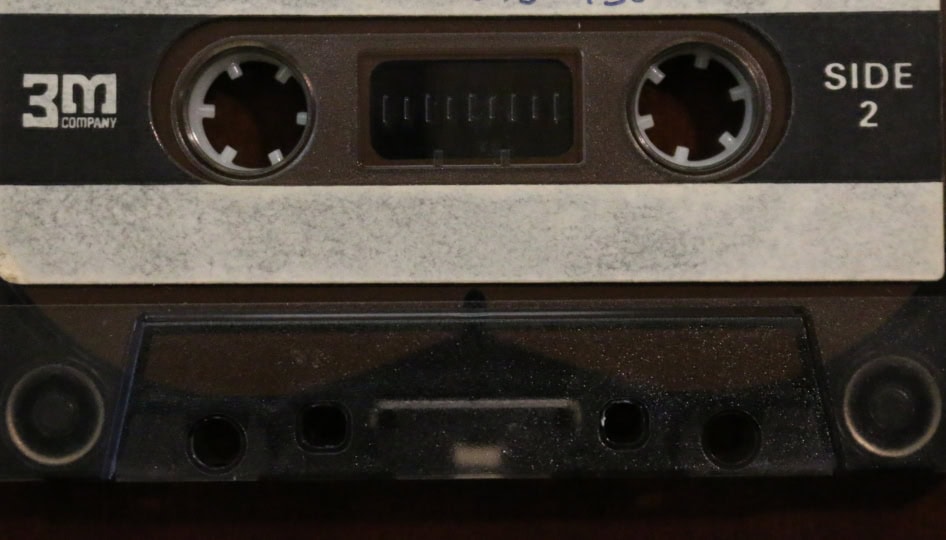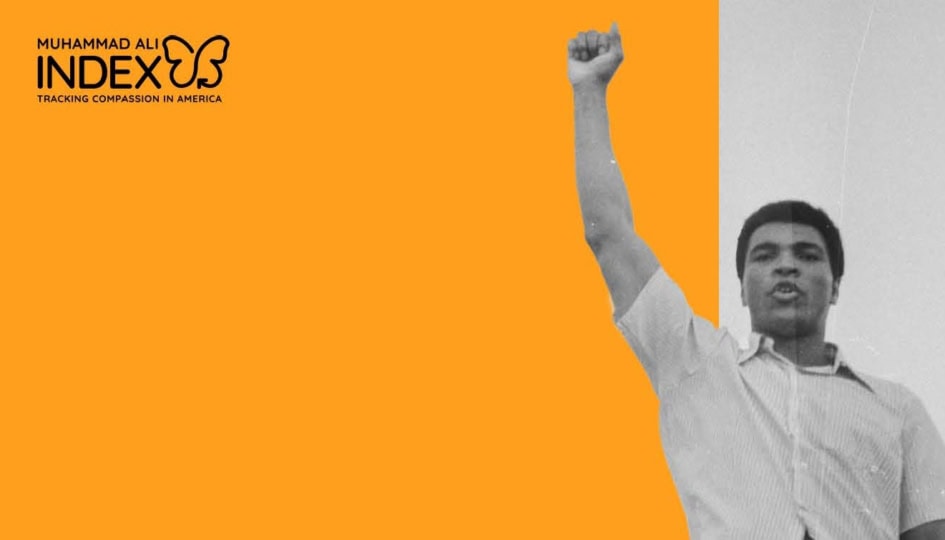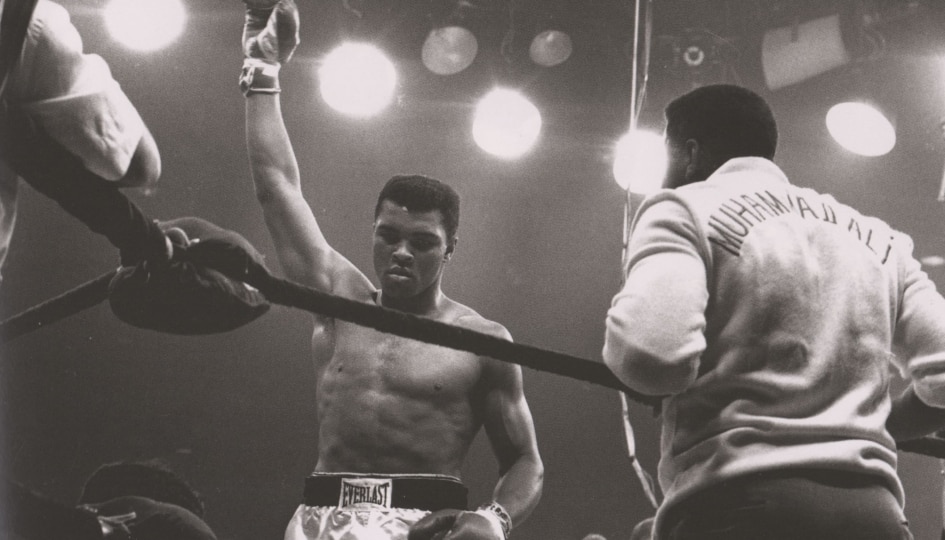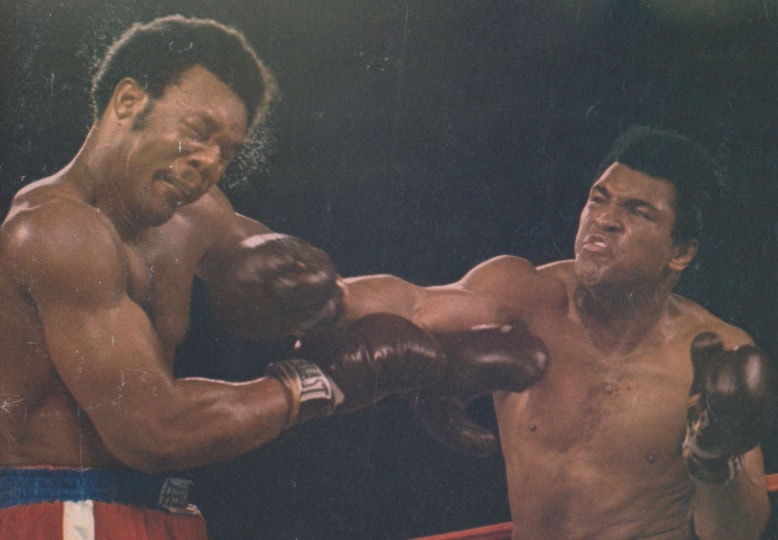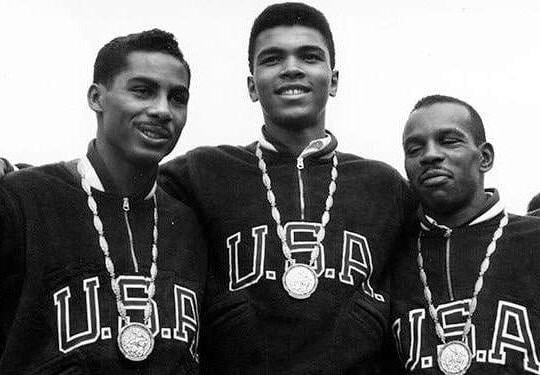The Champ of Compassion
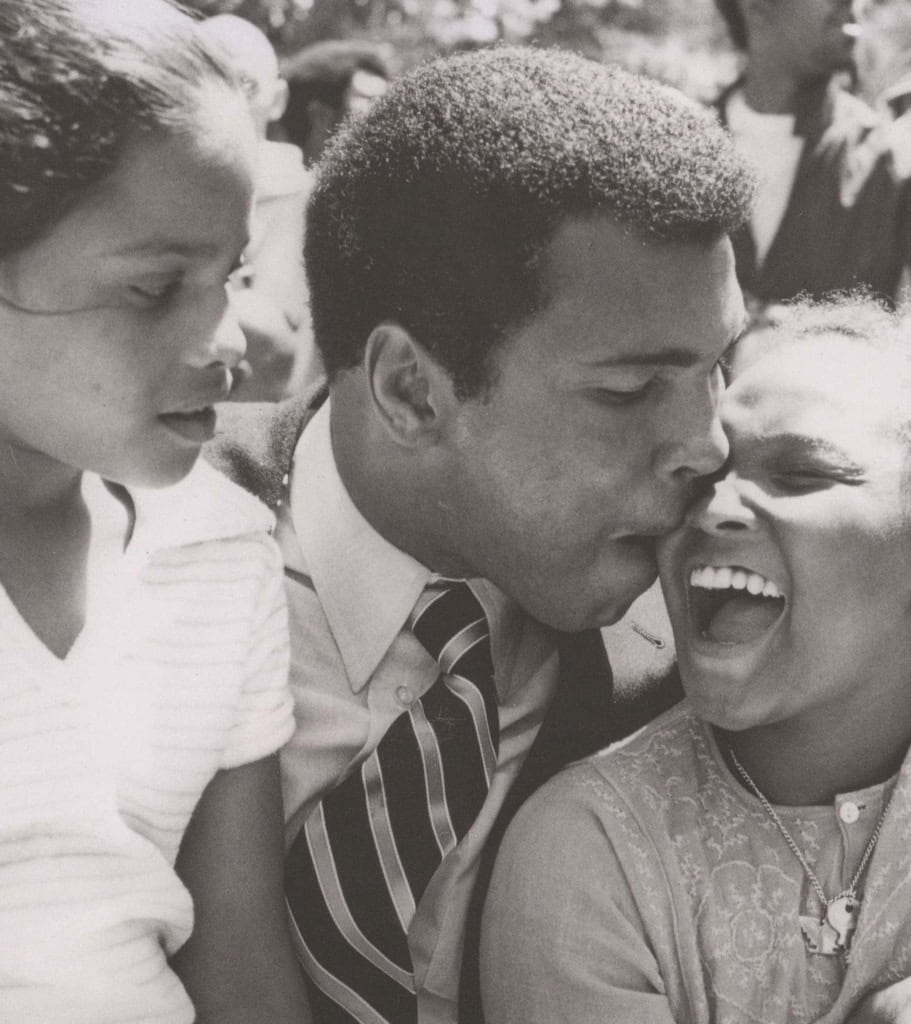
"All of my boxing... was just the start of my life. Now my life is really starting. Fighting injustice, fighting racism, fighting crime, fighting illiteracy, fighting poverty -- using this face the world knows so well and going out and fighting for truth and different causes."
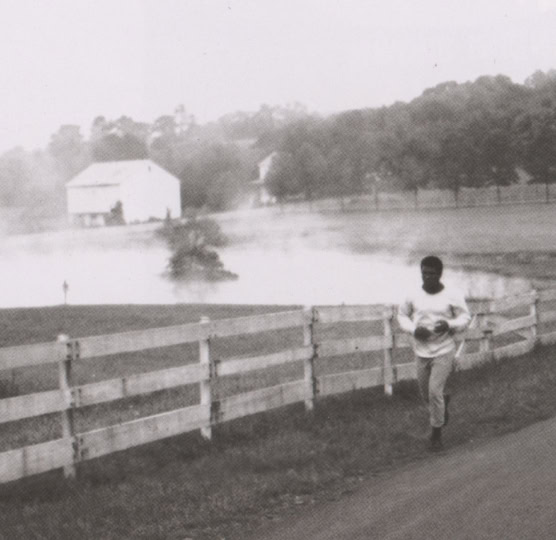
Compassion for Self
The foundation of all compassion
Compassion starts with the self, with research showing the greatest threats to compassion including stress, loneliness, alienation, burnout and lack of self-care. To show compassion to others, we must learn to show it to ourselves first.
From Cassius Clay to Muhammad Ali: Embracing Self-Compassion and Faith
As a young man of 22, Muhammad Ali—then Cassius M. Clay, Jr.—won his first World Heavyweight Championship title, defeating reigning champion Sonny Liston, famously declaring that he “shook up the world”. The following day, Ali shook the world again. Though many suspected Ali was a member of the Nation of Islam, he publicly announced he had chosen Islam as his faith. While he had been linked to the religion for several years, this confirmation was an assertion of his autonomy and rejection of societal pressures. When he adopted the name Muhammad Ali ten days after the fight, he not only publicly embraced a new religion but also claimed ownership of his identity.
This proclamation came at a time when the religion of Islam was considered controversial and Ali’s decision was met with often harsh criticism, yet he remained steadfast. His conversion provided him with the inner peace and strength to stand firm in the face of adversity. It marked the beginning of a journey where his actions, both in and out of the ring, would be guided by his faith, self-compassion, and an unwavering commitment to personal integrity. Through this transformation, Ali showed the world that true greatness begins from within.
"My fighting had a purpose. I had to be successful in order to get people to listen to the things I had to say… I wanted to be a champion who was accessible to everyone. I hoped to inspire others to take control of their lives and to live with pride and self-determination."
Watch Video Clip
Muhammad Ali answers a question about the Muslim faith and his continued need to do good during a recorded interview in Newcastle, 1977.
Watch Video Clip
Muhammad Ali answers a question about the Muslim faith and his continued need to do good during a recorded interview in Newcastle, 1977.
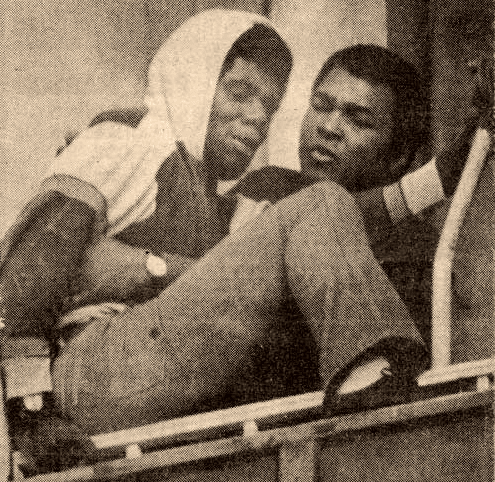
Compassion for Other Individuals
How we treat others around us
Recent years have seen a decline in our ability to treat others with compassion and respect. An increase in rudeness and lack of compassion towards service workers, participants in online forums, healthcare workers, flight attendants and in communal spaces have left a need for empathetic reskilling.
30 Minutes of Compassion: A Life-Changing Conversation
Eleven months before the final fight of his legendary career, while living in the Hancock Park neighborhood of Los Angeles, Muhammad Ali helped save a young man from suicide. Witnesses reported that it was Ali alone who saved the 21-year-old, who was threatening to jump from a ninth-story window in downtown L.A. When Ali arrived on the scene, he approached a nearby window and calmly told the young man that he loved him, that he was his brother. After 30 minutes, the young man agreed to step down and followed Ali out of the building, allowing himself to be taken to a Veterans Administration Hospital.
Ali is said to have promised, ‘I’ll visit him every day for the next two or three days and then meet his family.’ And, by all accounts, he kept his word. This moment serves as a testament to Ali’s boundless compassion. Ali treated all people with respect, responding when he saw someone in need, innately understanding that each life is valuable and worthy of compassion.
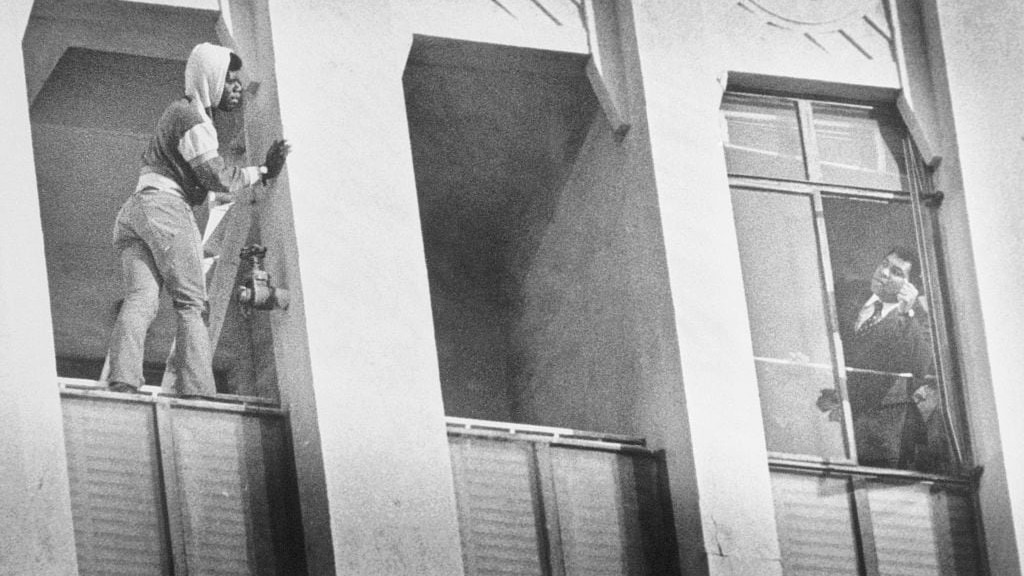
From The News
“In some sort of ways, he talked a lot of people off the ledge,” reporter Robert Lipsyte says. “I think about a guy who made people brave."
From The News
“In some sort of ways, he talked a lot of people off the ledge,” reporter Robert Lipsyte says. “I think about a guy who made people brave."
Check out our Digital Exhibit below!
Watch Video Clip
CBS News' Walter Cronkite reports on the incident that occurred on Jan. 19, 1981.
Watch Video Clip
CBS News' Walter Cronkite reports on the incident that occurred on Jan. 19, 1981.
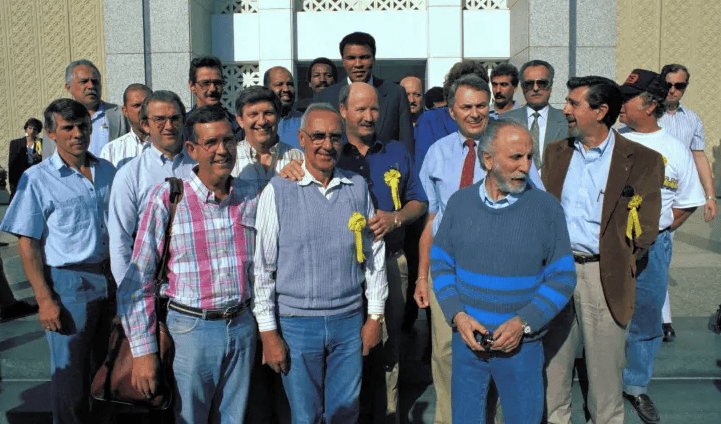
An Individual Approach to Compassionate Diplomacy
In November 1990, Muhammad Ali travelled to Baghdad, Iraq, with a mission to meet Saddam Hussein to negotiate the release of United States citizens taken hostage during the August 2, 1990, invasion of Kuwait, despite warnings from the U.S. State Department. It was reported that Ali spent nearly an hour in conversation with Hussein, met working to secure the hostages’ release.
Ali’s visit to Iraq and his meeting with Hussein led to the release and return of the 15 U.S. hostages. He returned to the United States December 4, 1990, accompanied by the hostages he helped free
This was not the first of Ali’s attempts to provide aid in hostage situations, nor would it be the last. In 1979, during the Iran hostage crisis, Ali offered himself in exchange for 60 United States Embassy personnel who had been taken hostage in Tehran. He proposed to hold his next fight in Tehran, Iran in exchange for the hostages’ release. Then, in 2015, Ali issued a statement for the release of the imprisoned journalist Jason Rezaian from Iranian authorities.
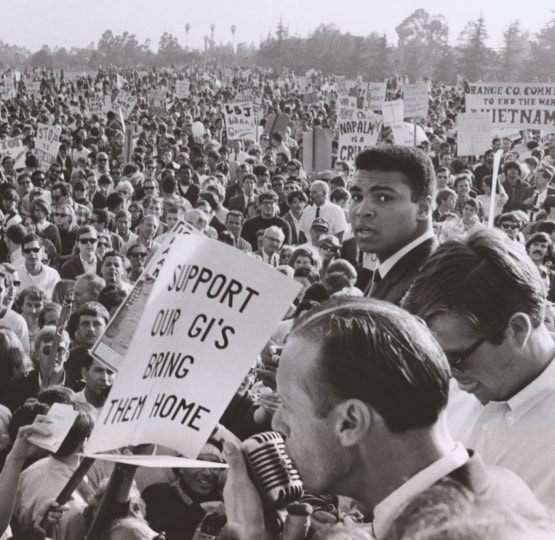
Compassion for Other Groups
Showing kindness to all groups of people, not just those similar to us
Compassion in America struggles with ‘Otherness’ and in how we treat other groups different from us. Internet silos make it increasingly difficult to push past our differences of race, gender, religion, ethnicity and sexual orientation to treat others with respect, dignity and compassion.
Championing Peace in the Face of War and Persecution
On June 23, 1967, Muhammad Ali addressed a crowd that had gathered for a peaceful march protesting the Vietnam War. Dr. Benjamin Spock spoke alongside him, with other leaders such as Martin Luther King Jr. also present. The march was set to go from Cheviot Hills Park passing the Century Plaza Hotel, where President Johnson was attending a Democratic fundraiser, before returning to the park. The peaceful event, however, turned violent when protesters stopped to occupy the space around the hotel, and police forcefully removed them. This took place just a few short months after Ali refused to be drafted, stating his conscientious objector status based on his religion, and only three days after being convicted of draft evasion. Ali’s objection to the draft was rooted in his belief that the violence against the Vietnamese was both unnecessary and against his religious principles.
In a time of deep societal divisions, Ali’s stance was a powerful act of defiance, emphasized by his participation at the march rally. His refusal to participate in the war was driven by a deeply held belief in peace, justice, and compassion. His courage in the face of public backlash and legal consequences stands as a testament to the strength of standing firm in one’s convictions.
"I will not disgrace my religion, my people or myself by becoming a tool to enslave those who are fighting for their own justice, freedom and equality."
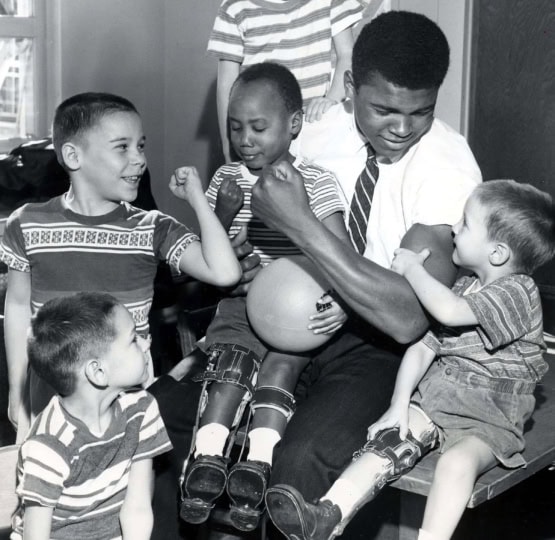
Compassion for Local Community
Caring for the people who live and work around you
Locally, compassion is in the active state of repair as Americans form a counterbalance for the division rampant at the national level. Active participation in volunteer work, local elections, parent-teacher associations, as well as showing overall service to community goals is fueling small scale coalitions of empathetic understanding.
First Round of Generosity: Ali’s Legacy of Compassion Begins at Home
On June 23, 1967, Muhammad Ali addressed a crowd that had gathered for a peaceful march protesting the Vietnam War. Dr. Benjamin Spock spoke alongside him, with other leaders such as Martin Luther King Jr. also present. The march was set to go from Cheviot Hills Park passing the Century Plaza Hotel, where President Johnson was attending a Democratic fundraiser, before returning to the park. The peaceful event, however, turned violent when protesters stopped to occupy the space around the hotel, and police forcefully removed them. This took place just a few short months after Ali refused to be drafted, stating his conscientious objector status based on his religion, and only three days after being convicted of draft evasion. Ali’s objection to the draft was rooted in his belief that the violence against the Vietnamese was both unnecessary and against his religious principles.
In a time of deep societal divisions, Ali’s stance was a powerful act of defiance, emphasized by his participation at the march rally. His refusal to participate in the war was driven by a deeply held belief in peace, justice, and compassion. His courage in the face of public backlash and legal consequences stands as a testament to the strength of standing firm in one’s convictions.
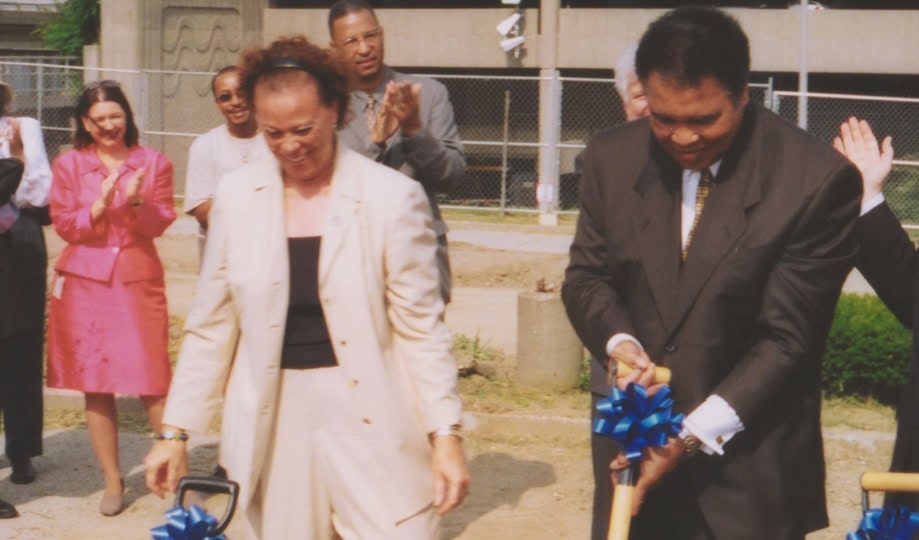
Building Greatness in The Champ’s Hometown
On November 21, 2005, the Muhammad Ali Museum and Education Center, fondly referred to as the Muhammad Ali Center, officially opened to the public. Founded by Muhammad and Lonnie Ali, the Center was intended to inspire visitors to discover their greatness.
The Muhammad Ali Center’s mission to inspire individuals was meant for all, it was also intended to build a deep connection with the local community. Ali, a proud son of Louisville, always believed in using his platform to advance justice and do good. The Ali Center serves not only as a tribute to his athletic achievements and legacy but also as a beacon of hope, compassion, and community for the city that shaped him. It symbolizes how greatness extends beyond personal accomplishments – how one’s pursuit of greatness can uplift an entire community, and how true greatness is intertwined with the commitment to helping others find their own path to greatness.
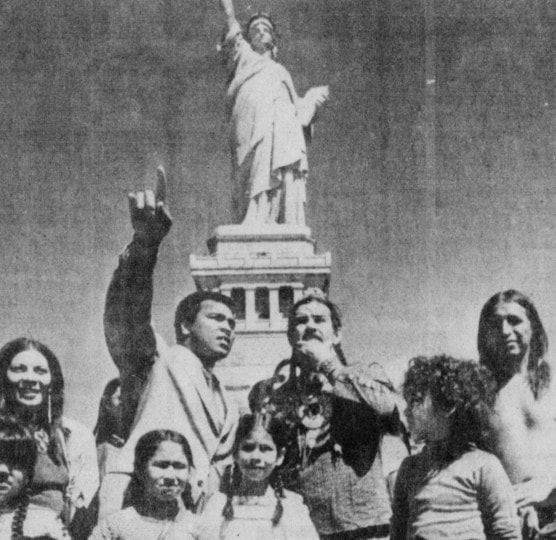
Compassion for Nation
Taking kindness to a national level
Compassion at the national level faces strong tensions in a divisive political climate that emphasizes differences over similarities. While Americans seem divided across every major issue from democratic process to environmental stewardship, shared values have the potential to shape a more empathetic discourse on civil politics, policy, and governance.
A Champion for Justice: Ali’s National Stand for Native American Rights
From Alcatraz Island, San Francisco, to Washington, D.C., the American Indian Movement’s Longest Walk aimed to raise awareness about violations of Native American’s rights and protest the eleven anti-Indian bills introduced in Congress that threatened treaty rights, including threats to their land, hunting, and fishing rights.
Ali joined the march as they entered Capitol City on July 15, 1978. He was also present at the concert on July 23 at the Armory Starplex, where the proceeds were dedicated to helping fund the return travel for the protesters who had walked across the country. As part of the events on July 23, Ali boxed a ten-round exhibition fight against sparring partner, Jimmy Ellis.
Ali’s presence at the rally and his participation in the exhibition fight to raise funds for the protestors illustrates his compassion for the Native American community’s struggle for justice, their fight for equal rights, and their efforts to preserve their cultural heritage. His involvement demonstrated not just his support for their cause, but his broader commitment to using his platform to amplify the voices of marginalized communities. This is an example of not only a personal act of compassion but a public statement about the potential for compassion to bridge divides, shape more empathetic discourse, and foster a sense of common purpose in a fragmented society.
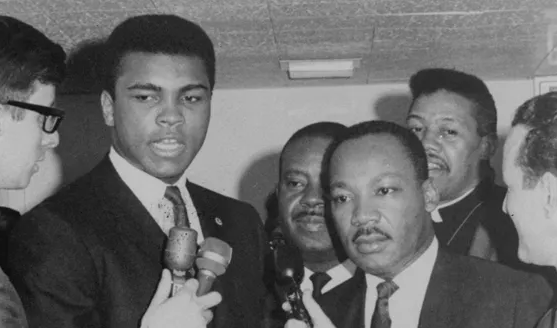
Shared Struggles, Shared Humanity
In May 1967, protesters in Louisville were planning demonstrations to demand fair housing rights, and one such demonstration planned to disrupt the Derby. A threat to the city’s annual, world-renowned event, the slogan “No Housing, No Derby” became a promise from protesters. Dr. Martin Luther King, Jr.’s brother, Reverend A.D. King, pastored at Louisville’s Zion Baptist Church and played a pivotal role in the local movement for fair housing, and was a key component of getting the Southern Christian Leadership Conference, of which Dr. King was president to come to Louisville, Kentucky.
Civil Rights leaders Muhammad Ali and Dr. King were both in the city and spoke at a rally, organized to support the cause. During his speech, Ali expressed his solidarity with the cause, saying,
“In your struggle for freedom, justice, and equality, I am with you. I came to Louisville because I could not remain silent. My own people—many I grew up with, went to school with, and share blood ties with—were being beaten, stomped, and kicked in the streets simply because they sought freedom, justice, and equality in housing.”
The two leaders also reportedly spoke privately for an hour and a half. Dr. King later described their discussion as focusing on “our common problems and our common concerns. We are victims of the same system of oppression. Although our religious beliefs differ, we are still brothers.”
The 1967 Fair Housing rally in Louisville, Kentucky, where Muhammad Ali and Dr. Martin Luther King Jr. stood together, serves as a profound example of compassion extending from the local to the national level. Their advocacy, alongside Reverend A.D. King and the local movement, illustrates how acts of solidarity and empathy can unite individuals and communities in the fight for justice and equality.
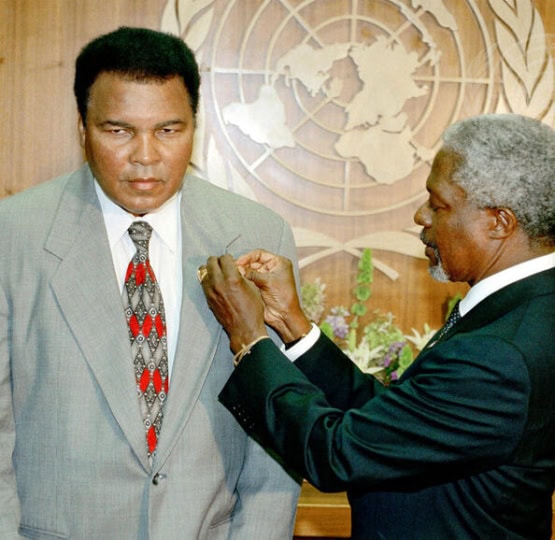
Global Compassion
Showcasing kindness and compassionate acts around the world
United Nations Messenger of Peace
Presented by United Nations Secretary-General Kofi Annan for Muhammad Ali’s global efforts to “promote tolerance, love, and peace,” Ali was recognized on September 15, 1998, with the United Nations Messenger of Peace award. The honor included a framed citation and a lapel pin in the shape of a dove.
The United Nations chose Ali for this recognition due to his extensive humanitarian work and international activism, including goodwill missions such as a trip to the Soviet Union and visits to Cuba with his wife, Lonnie Ali, where they delivered medical equipment and supplies to children’s hospitals. These acts of service reflet a deep empathy for people facing hardships worldwide and underscored Ali’s belief in the power of love and generosity to unite humanity.
The Proclamation reads:
“…noting your desire to help focus worldwide attention on the noble aims and objectives enshrined in the United Nations Charter, admiring your devotion to the creation of a safer and more stable world the fostering of human rights, and the liberation of the human spirit, honouring the fact that you have, over the course of your extraordinary career as an athlete and humanitarian, demonstrated time and again your dedication to what is best in humankind, conscious that your example has shown what can be achieved when people of good will join together on behalf of a better world, hopeful that through your contributions to sports and human rights, the message of peace, harmony and human dignity will resound throughout the nations.”
Ali’s commitment to global compassion was evident years earlier, in 1978, when he visited the United Nations. Speaking before the UN Special Committee against Apartheid, he offered a message of peace and spirituality, rooted in an understanding of human connection. In his address, he stated, “A man is his heart…Regardless to man’s title, regardless to man’s wealth, rank, or position, if the heart is not great, then he cannot be great. But if the heart is great, that man remains great under all circumstances — rich or poor, large or small — so it is the heart that makes one large or small.”
These words resonate as a call to global compassion, reminding us that greatness lies not in power or wealth but in the capacity to care for others. Through his words and actions, Muhammad Ali championed a vision of a world where empathy transcends borders, fostering peace, harmony, and dignity for all.
Watch Clip
Muhammad Ali addresses the UN Special Committee against apartheid, promoting peace and unity.
Watch Clip
Muhammad Ali addresses the UN Special Committee against apartheid, promoting peace and unity.
